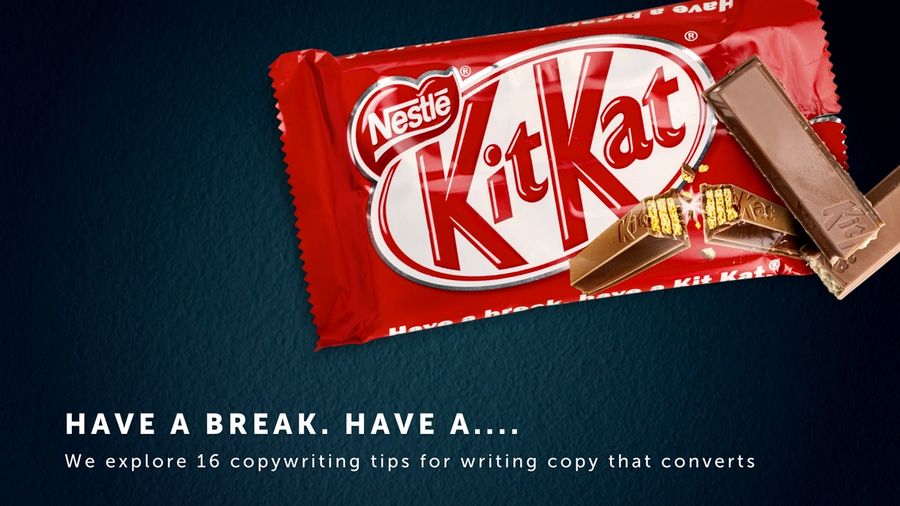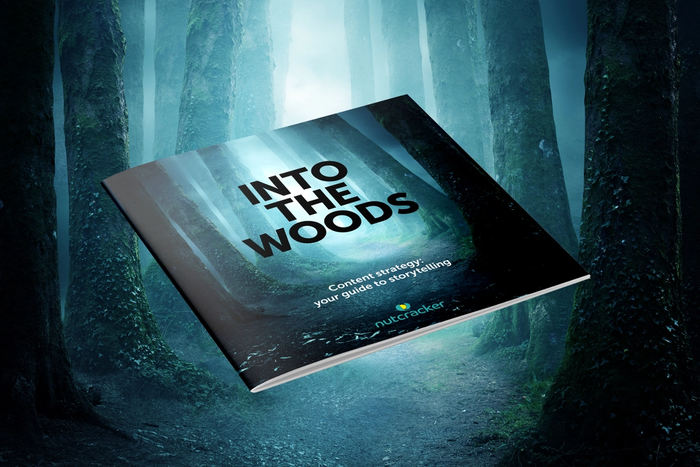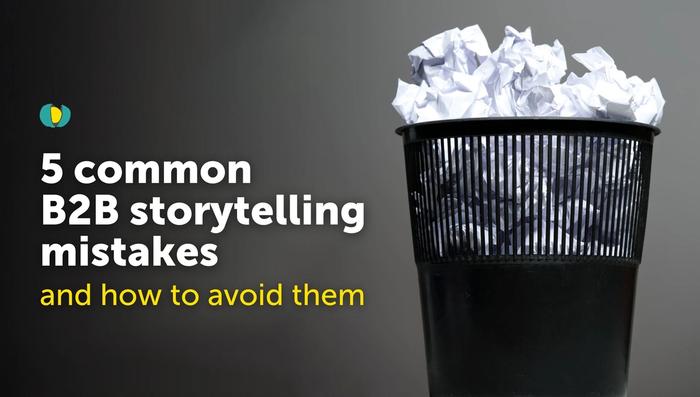Content Marketing & SEO
16 Copywriting Tips for Writing Copy That Converts
Writing good copy is hard. Writing clever and engaging copy is even harder. Wouldn’t it be great if you could ask the best copywriters around how they're able to write copy that converts?
Oh look, we have.
Use these 16 copywriting tips to turn skim‑readers into pipeline‑ready leads.
1. Collect weird facts
“Human beings collect weird sh*t,” says award-winning adman Steve Henry –creator of the ‘You’ve been Tango’d’ ads among others. “We’re fascinated by weird stuff and bored by plonky logic. If I tell you that you can buy an app that wakes you up with the smell of bacon, I may have your attention for a while. Great copywriters collect weird facts.”
2. Don’t save the best till last
“People are bombarded with words everyday,” says Joe Weir of Joseph Bloggs ltd. “You’ve got to grab them in the first five seconds. Pick the most important point, the thing that they absolutely must know, and make sure it’s right up top.”
3. Keep it short
Jonathan Higgins writes multi-million-pound bids for giants like Serco and MTR. “As a rule of thumb, a sentence can never be short enough. Almost. At your peril, should you venture past two lines… and lose the ellipses.”
4. Ditch the jargon
“Make sure your sentences are something your mum could understand,” says Pete Brown, award-winning beer blogger, novelist and former advertising planner. “I once told some friends that my favourite beer depended on the ‘usage occasion’. I’ve never lived it down.”
5. Share your knowledge
“Be an intellectual democrat and share your knowledge,” says Stuart Forbes – who works with global brands like Adidas, GlaxoSmithKline and Tetra Pak. “Posting links to interesting articles and websites is one of the quickest ways to establish a rapport with your reader.”
6. Write like you speak
Advertising copywriter, Christopher Keatinge, picked up the prestigious Cannes Lion award for his Thomson Ogre ad this year. What’s his secret? “Write like you’re talking. I always think that helps me find my style and tone of voice.”
7. Use emotion, not logic
When it comes to advertising, “logic is less important than emotion,” says Steve. “It’s important not to be a product bore. If you tell me that your toothpaste works twice as well as the one I’m currently using, and you go into a lot of technical jargon, I probably think you’re a smarmy arrogant tw*t. I jump to the conclusion that you’re lying and I want to punch you in the face. Imagine you’re talking to a friend. Most clients think people are hugely interested in the product. They’re not.”
8. Spellcheck
“Sort ya motherflippin’ spelling and grammar out,” says BMB copywriter, Tom Sillars. “A baldly spalled websight is the equivalent of a musty smelling used car salesman firing flecks of spittle over you while he tries to flog you something.”
9. Inform, or DJ
“Be informative,” says Stuart. “If you can’t be informative, be interesting. If you can’t be interesting, be entertaining. If you can’t be any of these things, be a breakfast radio DJ.”
10. Break the rules
“It’s okay to start sentences with ‘and’, end them with prepositions and use split infinitives,” says Jonathan.
11. Picture your reader
“Treat your reader with respect – get a picture in your head of someone you like and respect,” says Steve. “Imagine communicating with someone you don’t respect, what’s that going to look like?”
12. Give it time
According to Jonathan, time heals all wounds – especially literary and linguistic ones. “Come back to your draft a day later, he says. “You’ll be surprised at how terrible a writer you really are!”
13. Banish the semi-colon
Know when your grammar checker tells you to use a semi-colon? “Don’t do it,” says Jonathan. “Use semi-colons sparingly, and never when a grammar checker tells you. In fact, never use them at all; they’re sh*t.”
14. Stick to what you know
“White papers are not valuable in and of themselves,” says Stuart. “Only write what you really know – there’s nothing worse than empty, patronising, generic-wisdom b*llocks written by ill-informed charlatans who think that the act of saying something is the same as having something to say.”
15. Read it backwards
Joe proofreads backwards. Why? “It’s much easier to spot typos that way.”
16. Swap things for actions
According to Joe, when we write, we have a habit of turning actions into things – or verbs into nouns. “Putting the customer in the middle’ becomes ‘customer centrification’,” says Joe. “And ‘finding answers faster’ becomes ‘an accelerated solutions process’.” Don’t do it.
If you want to talk in more detail with copywriting experts, Nutcracker is here to help. Call us on 020 3941 0305 or get in touch at hello@nutcrackeragency.com
Want more tips?
1. Lead with a value‑packed headline
Your headline pulls 80 % of eye‑time, according to Nielsen Norman Group.[¹] Make the benefit blindingly obvious within the first 55 characters.
Fix it: Swap fluffy superlatives ("innovative", "world‑class") for a concrete outcome ("Cut onboarding time by 50 %").
2. Front‑load the most important information
Busy executives skim F‑pattern style. Put the outcome or stat your reader cares about in the very first sentence.
3. Solve one problem per paragraph
Each block of copy should answer one question or crush one objection. Trim everything else.
4. Use the PAS formula (Problem–Agitate–Solution)
Classic, because it works: describe the pain, twist the knife, then present your product as relief.
5. Write like you talk—but tighten every sentence
Contractions, short words and second‑person voice keep copy human. Then remove 30 % of the words.
6. Swap adjectives for numbers
Specific numbers build credibility (“Save £12,430 a year”) where superlatives flop.
7. Break long copy with bullet lists and sub‑heads
Scannability increases dwell time and comprehension. Aim for one screen‑height per section on mobile.
8. Use active verbs, not passive constructions
“Download the report” beats “The report can be downloaded”. Punchier and action‑oriented.
9. Layer social proof strategically
Quotes, logos and statistics near CTAs reassure risk‑averse B2B buyers.
10. Match CTA text to the reader’s stage
Early‑funnel? “Get the guide.” Late‑funnel? “Book a demo.” Keep one clear action per page.
11. Address objections before they arise
Common blockers—price, implementation time, security—deserve a proactive sentence or dedicated FAQ.
12. Harness power words sparingly
Words like “instantly”, “proven”, “guaranteed” trigger action, but overuse erodes trust. Two per page is plenty.
13. Optimise for feature snippets
Answer your primary keyword in ≤ 40 words, formatted as a paragraph, list or table. Google loves concise clarity.
14. Localise when relevant
If 60 % of revenue comes from the UK, reference UK stats, spellings and examples.
15. Always include a secondary CTA
Not ready to talk? Offer a newsletter sign‑up or case‑study download to keep the conversation alive.
16. Test, iterate, repeat
A/B test headlines, openings and button copy monthly; even 2 % lift in click‑through can equal thousands in new pipeline.
Ready to turn words into revenue?
Our NX3 framework fuses strategy, creativity and digital channels to turn compelling copy into qualified leads.
Start with insights and book a free marketing audit or talk to our lead generation team on 020 3941 0305.
Written by Charlotte Delaney, Head of Content.
Share this:




